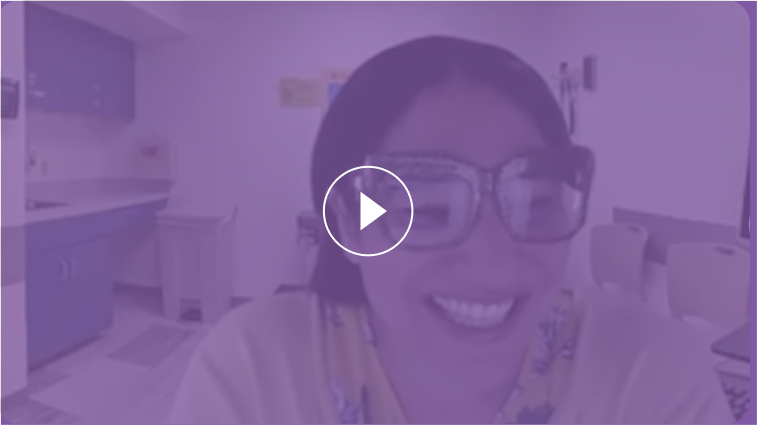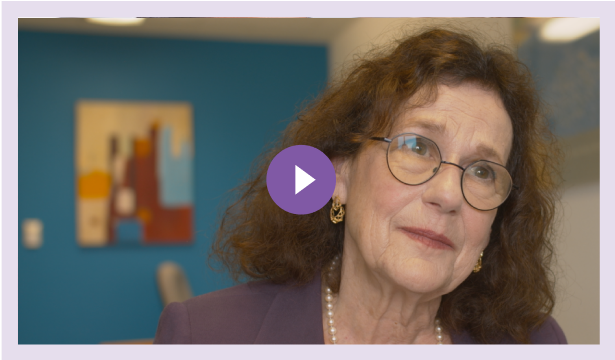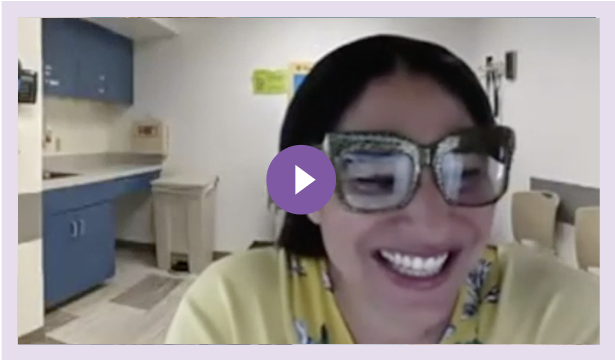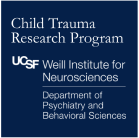Jocelyn, 30, is a first-time mom, trying to be available to her 15-month-old daughter while dealing with the pressures of full-time work and the worry of getting quality, affordable child care. Jocelyn has never been screened for ACEs before and is surprised by the questions.
What Jocelyn Is Thinking as the ACEs Screening Is Introduced
- I just want what is best for my baby.
- I feel really overwhelmed and anxious.
- These questions remind me of experiences I’ve had that I don’t want my daughter to experience.
- I’m not sure the clinic should be asking these questions, so I hope my doctor can help me understand.
Learning Objectives:
- Recognize approaches to inquiring about and validating adversity, distress and strengths in ways that support healing
- Identify words and practices within the TRIADS framework that resonate with your own approach to health care
- Practice applying the TRIADS framework
Watch & Learn

4 min
Introducing the screening
Cherri, a nurse, e-mailed Jocelyn the PEARLS questionnaire prior to this telehealth visit and will now administer the screener.

3 min
Provider Response
Dr. Dayna Long, a pediatrician, explains the purpose of the screening and reassures Jocelyn.
Finding Your Own Words
Below are some commonly asked questions and an example response. The aim is to help you find your own words when communicating with your patients about the ACEs screening.
My child is so young. How could these traumatic experiences happen so soon?
You know, surprisingly, there are children who have gone through these things, and we just want to make sure that we address it early.”
What can I do to protect my child from the effects of traumatic experiences?
What we know is that your relationship with Dee is the most important in terms of making sure that she’s healthy, strong and resilient. You and Dee have the most extraordinary relationship. Every time I see you guys together, it just makes me smile. I love the fact that she loves to read with you, that you guys love to snuggle with one another. She’s just such an amazing young girl. So you’re doing an awesome job.”
What does stress have to do with my baby’s health?
We know that hard things happen in life, and stress affects young children. It certainly affects us as adults. We know that stress can affect our hearts, minds and bodies. Sometimes, if that stress is prolonged and serious, such as those questions in that questionnaire, it can lead to poor health ultimately.”
Why are you asking me these questions?
Part of our role as physicians is to make sure that we are supporting you and understanding that what happened in your life certainly has influenced your course.”
Reflective Practices
Self Reflection
Now that you’ve reviewed the scenario above, reflect on the questions here, either on your own or in a group setting:
- How do you think that went?
- What do you think went well and what could have been improved?
- What language could you see yourself using when conducting an ACEs screening?
- How might this scenario be different if it were in person rather than telehealth?
Mentoring Moments
After you’ve had a chance to reflect on your own, view a conversation between the health care team and Dr. Alicia Lieberman, Professor of Psychiatry at UCSF and Director of the Child Trauma Research Program.

Introducing the Screening
Dr. Alicia Lieberman and nurse Cherri discuss finding accessible language to use with patients. “It’s so interesting what words do,” says Alicia. “They have a lot of power.”

Provider Response
Dr. Alicia Lieberman and Dr. Dayna Long discuss finding the time in a 15-minute visit to connect in genuine and joyful ways with patients and addressing the anxiety that clinicians understandably feel.
Now You Try It
Note: This is intended for all members of the health care team. Remember that we’re all learning and that there are no mistakes.
Review
- Find the words and the body language from the Watch and Learn section that feel comfortable for you and that you can envision using in your conversations with patients.
- Jot down some of the suggestions from the Reflective Practice section that were most helpful to you.
- Now take a moment and visualize yourself running through this scenario with a patient.
Practice
- On your own or with another person, practice using the words and the body language that convey the message that you want. Alternatively, you can record a voice memo or video on your phone so that you can play it back to review. You may also get feedback from a trusted colleague or friend.
- In a group setting, pair-share or self-reflection, consider these questions:
- What came easy to you? What would take some work?
- What do you think you are doing well?
- What do you need some practice with?


